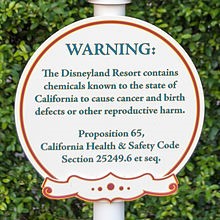 In our last blog post we discussed what Proposition (“Prop”) 65 is and what is changing with the revised law that is going into effect this August. Here we’ll share what can happen if you’re not compliant and what it means to you and your business.
In our last blog post we discussed what Proposition (“Prop”) 65 is and what is changing with the revised law that is going into effect this August. Here we’ll share what can happen if you’re not compliant and what it means to you and your business.
Failure to Provide Proposition 65 Warnings
Proposition 65 was designed, initially, to be enforced by the California Attorney General Office and/or any district attorney or city attorney for cities whose population exceeds 750,000. In the event a consumer food product is discovered to contain chemicals at levels which exceed the permissible NSRLs and/or MADLs, and the consumer product does not have a warning, then these attorneys could bring a lawsuit against the offending companies.
Penalties for violating Proposition 65 can be as high as $2,500 per violation per day.
However, because of the vast number of potential exposures and violations, it is unreasonable to expect that government attorneys would have the resources or time to adequately enforce Proposition 65. As a result, consumer advocacy groups, private citizens and law firms are allowed to enforce Proposition 65 on the government’s behalf.
These groups are constantly assessing consumer food products without Proposition 65 warnings to see if they contain Proposition 65 chemicals which exceed the permissible NSRLs and/or MADLs. In the event any such consumer food products are discovered to contain chemicals at levels which exceed the permissible NSRLs and/or MADLs, then these groups will often initiate proceedings against the company that manufactured the product, or retailer which is selling the product, or both.
60-Day Notices and Litigation
In the circumstance detailed above, where a food product without a warning is discovered to contain a chemical above the applicable NSRL and/or MADL, the entity (i.e., a private citizen, consumer advocacy group or law firm) enforcing Proposition 65 will serve a 60-Day Notice on the alleged violator. This entity will also contemporaneously serve a notice of the violation on the State Attorney General, and all district and city attorneys capable of enforcing Proposition 65. In the event none of the governmental attorneys initiate enforcement proceedings against the alleged violator within 60-days, then the entity that provided the notice of alleged violation will be permitted to file a private lawsuit against the alleged violator.
Although, once a lawsuit is filed, the alleged violator will typically have multiple defenses that are available, because of the complexity of the scientific issues underlying Proposition 65 litigation, most parties will settle, and agree to alternative levels and/or providing warnings, and to pay civil penalties and attorneys’ fees. The civil penalties and attorneys’ fees can be substantial. In 2016, for instance, the total amount of all proposition 65 settlements was $30,150,111.
Recommended Actions
Prop 65 60-Day notices have recently been filed for a wide-range of food products including gingerbread cookies (acrylamide), nutrition bars and shakes (lead and cadmium), baby food (acrylamide), potato chips (acrylamide), black olives (acrylamide), natural juices (lead), seasoning (lead), chocolate (lead and cadmium) bagels (acrylamide), and clams (lead). What does this mean?
There are likely very few food products that are likely immune from receiving a 60-Day notice.
What Suppliers Can Do
As a result of the Prop 65 changes, food manufacturers should continuously stay abreast of new Proposition 65 notices to ensure that the types of food products they are manufacturing are not being targeted. Manufacturers should also consider testing their products against the standards established under proposition 65 to ensure they are compliant. If not, they will require a warning.
What Retailers Can Do
In turn, food retailers should also continuously stay abreast of new Proposition 65 notices to ensure that the types of food products they are selling are not being targeted. Retailers should also send notices to their suppliers inquiring about whether the products they are purchasing may contain Proposition 65 chemicals about the established NSRLs and/or MADLs and, if so, whether they require warnings. Each of these inquiries and responses should, of course, be appropriately and carefully managed and documented.

